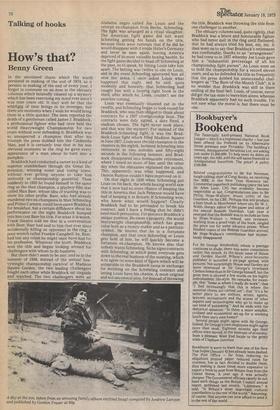Talking of hooks
How's that?
Benny Green
In the simulated chaos which the world persisted in making of the end of 1974, as it persists in making of the end of every year, I forgot to comment on an item in the obituary columns which belatedly cleared up a mystery which has been exercising my mind ever since I was nine years old. It may well be that the whirligig of time brings in its revenges, but there are moments when I wish he would bring them in a little quicker. The item reported the death of a gentleman called James J. Braddock, a professional fighter who had once held the world Heavyweight Championship for two years without ever defending it. Braddock was so unexpected a champion that after his triumph the press dubbed him the Cinderella Man, and it is certainly true that in his less elevated moments in the ring he gave every appearance of a man about to turn into a pumpkin. Braddock had conducted a career as a kind of superior stumblebum through the Great Depression, winning some and losing some, without ever getting anyone to take him seriously as championship potential. Then suddenly in 1935 he found himself in the same ring as the then champion, a playboy-film star called Max Baer, whose idea of training was to show his other profile. Baer, who had already murdered two ex-champions in Max Schmeling and Primo Camera, could have eaten Braddock for breakfast, but a certain diffidence about his performance on the night Braddock bumped into him cost Baer his title. For what it is worth, Frank Sinatra told me that iti a conversation with Baer, Baer had said to him that ever since accidentally killing an opponent in the ring, a poor wretch called Frankie Campbell, he, Baer, had lost any relish he might once have had for his profession. Whatever the truth, Braddock won the title and began looking around for challengers with whom to do business. But there didn't seem to be any, and so in the summer of 1936, instead of the annual heavyweight championship carnival at Madison Square Garden, the two leading challengers fought each other while Braddock sat ringside and watched. The two challengers wete an Alabama negro called Joe Louis and the veteran ex-champion from Berlin, Schmeling.
The fight was arranged as a ritual slaughter.
The American fight game did not want Schmeling getting his hands on the title, because there were rumours that if he did he would disappear with it inside Hitler's Germany and never be seen again, leaving America deprived of its most valuable boxing bauble. So the fight game decided to head off Schmeling at the pass, so to speak, by letting Louis take him apart. The betting was twelve to one on Louis, and in the event Schmeling splattered him all over the arena. I once asked Louis what happened that night, and he said, quite modestly and honestly, that Schmeling had caught him with a looping right hook in the third, after which he, Louis, couldn't see the punches coming.
Louis was eventually counted out in the twelfth, and Schmeling began to look round for Braddock, who was then obliged to think about contracts for a 1937 championship bout. The contracts were duly signed, a date fixed, a stadium chosen. The fight never took place, and that was the mystery. For instead of the Braddock-Schmeling fight, it was the Braddock-Louis fight which filled Madison Square in June 1937. Louis sent the, old champion to the cleaners in the eighth, battered Schmeling into retirement in two minutes and fifty-eight seconds in the following summer, and Braddock disappeared into honourable retirement, where I heard no more of him until the other day when the obituaries explained the puzzle. This, apparently, was what happened, and Damon Runyon couldn't have improved on it.
On that night in 1936 when Schmeling put Louis on his back, the whole boxing world saw that it now had no more chance of keeping the title in America that Jack Peterson would have had of keeping it in Britain. If Schmeling won, who knew what would happen? Clearly Braddock had to be persuaded to break his contract, and I have a feeling that he didn't need much persuasion. For perceive Braddock's unique position. He owns a property, the world heavyweight championship, which has great value both as a money-maker and as a patriotic symbol. He knows that he is a fortunate champion, and that once Schmeling or Louis gets hold of him, he will quickly become a fortunate ex-champion. He knows also that nobody wants Schmeling. So he signs contracts with Schmeling, at which point everyone gets down to the real business of the meeting, which is to agree on some kind of figure which will be acceptable to the Braddock camp in exchange for welshing on the Schmeling contract and letting Louis have his chance. A most original and not uncomical ploy, for instead of throwing the title, Braddock was throwing the title from one challenger to another.
The obituary columns said, quite rightly, that Braddock was a brave and honourable fighter who had never quit in the ring until flattened, that he had always tried his best, etc, etc. It then went on to say that Braddock's retirement was comfortable, thanks to an "arrangement" he had come to in 1937 whereby Joe Louis gave him a "substantial percentage of all his championship fight purses". As Louis went on to hold the championship for a record eleven years, and as he defended his title so frequently that the press dubbed his unsuccessful challengers as "The Bum-of-the-Month Club", it is no wonder that Braddock was still in there smiling at the final bell. Louis, of course, never did get the tax-man to leave him alone, whereas Braddock apparently had no such trouble. I'm not sure what the moral is, but there must be one.


































 Previous page
Previous page